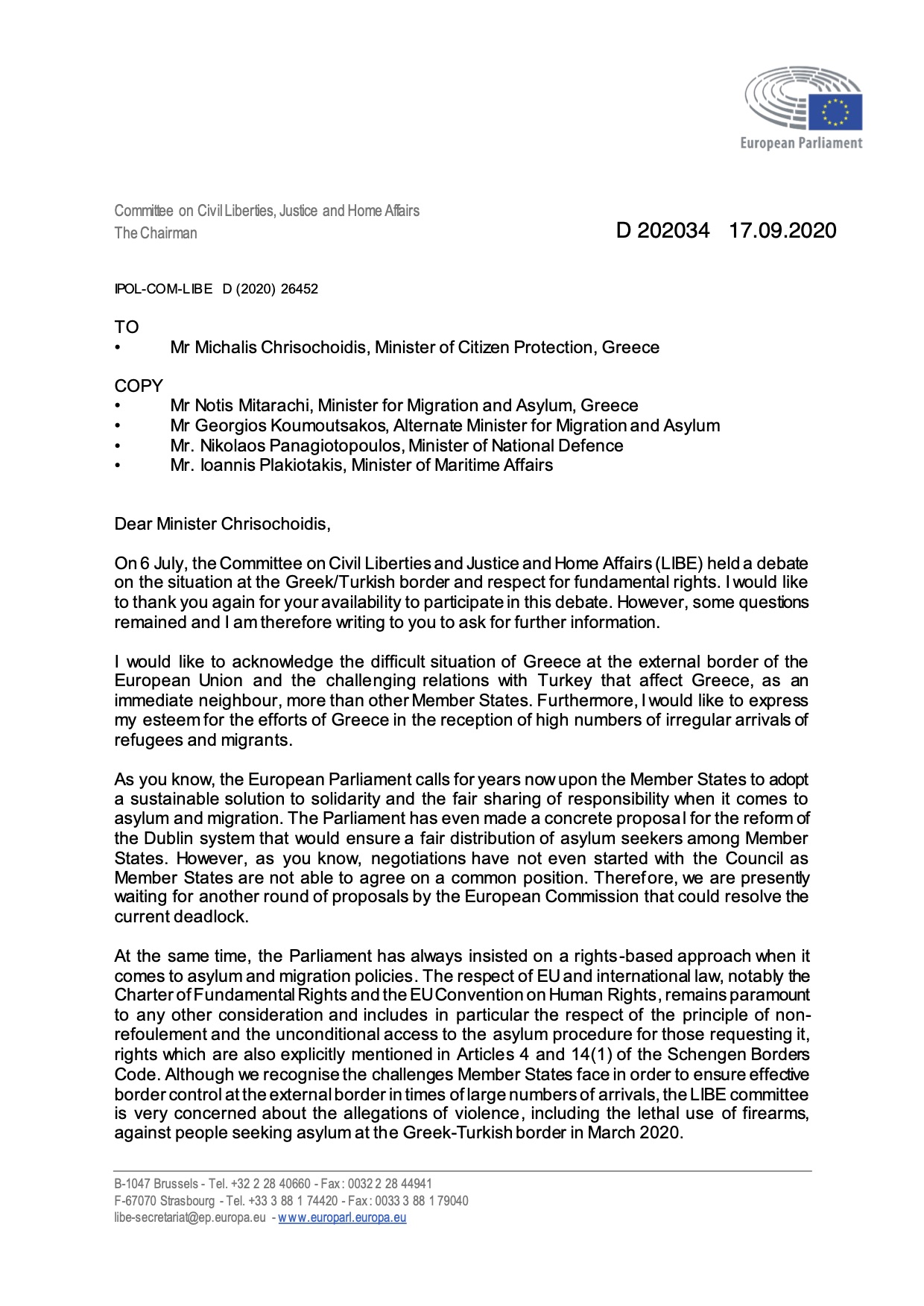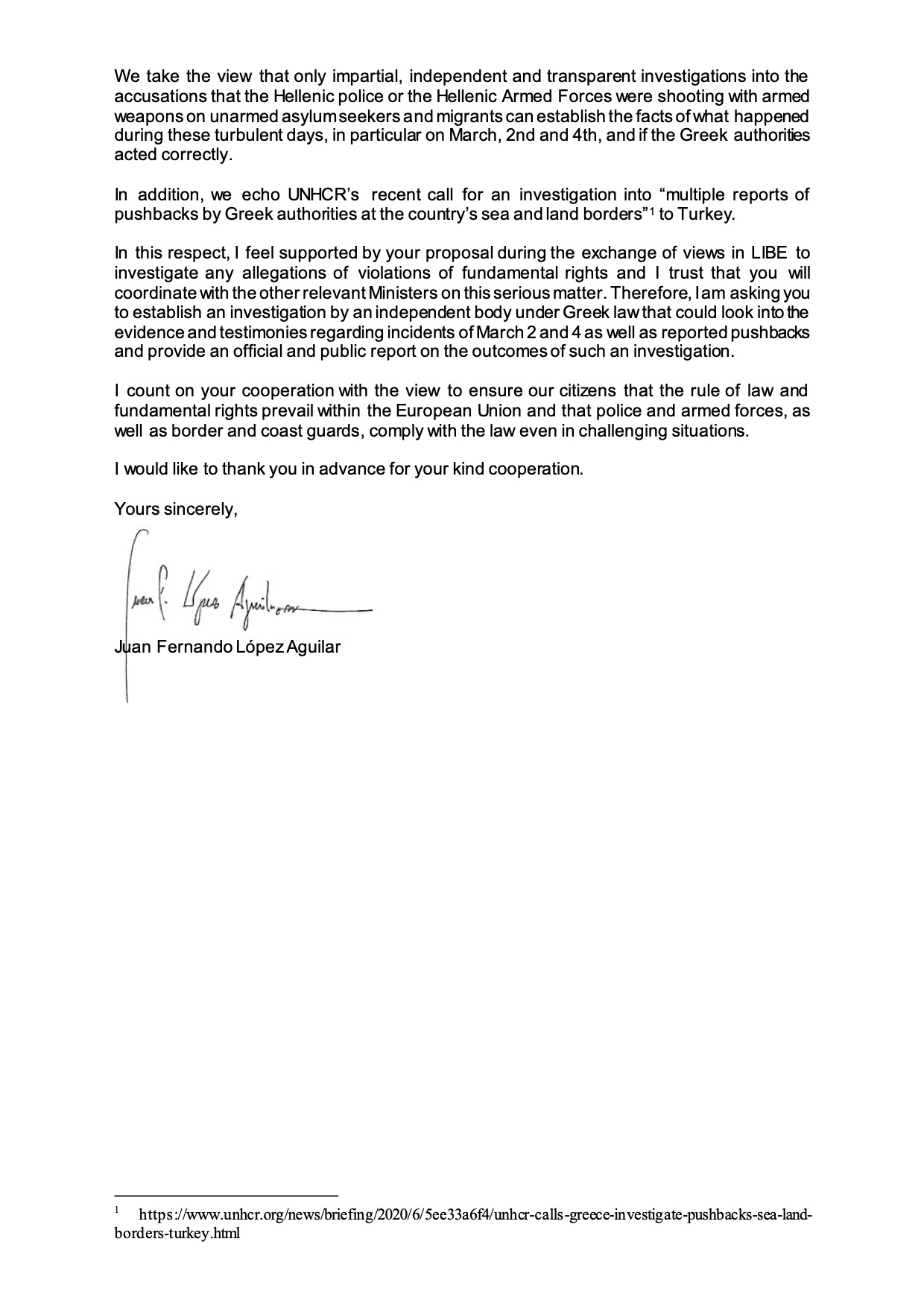- Date of incident: 30-9-2020
- Location: Thessaloniki
- Law enforcement involved: Greek Police Officers
- Number of people pushed back: 30
- Nationalities : Tunisian (respondent), Afghani, Moroccan, Algerian,
- How many had documents for sure: 1
- Demographics (women, children, etc): Infants and children involved
- Method of expulsion: People were driven to Evros/ Meriç river and they were forced to cross the Greek/ Turkish border.
- Documenting organisation: Border Violence Monitoring Network (BVMN)
- Description: The respondent stayed in the camp in Diavata when the police took him and other 30 to 40 other people from Diavata to the Police Headquarters (“Megalo”) in Thessaloniki. From Megalo, the respondent was taken to “another big police station” in the same white vans, with the same people from Diavata Camp. This time, the police took their bags, phones, and money. Afterwards, the respondent was put in a cell on a blue bus without windows along with the other people from Diavata. Then, the groups were transported in a car one after another to an “army station.” They were driving for around half an hour when the truck stopped “in a secret place” close to the border. Then, in groups of 15, the people walked to the river for approximately 20 minutes. At the river, before the people were loaded into a dinghy, they were beaten with tree branches and told “no one will come back after this torture” by the police.
30/09/2020
“YOU CAN’T IMAGINE HOW SOMEONE IS SLEEPING AND THEN SOMEONE TOOK ME BY FORCE FROM THIS PLACE”
Date and time: September 30, 2020 07:00
Location: Evros border
Coordinates: 41.323474855081, 26.501087458021
Pushback from: Greece
Pushback to: Turkey
Demographics: 30 person(s), age: 27, from: Afghanistan, Morocco, Algeria, Tunisia
Minors involved? Yes
Violence used: beating (with batons/hands/other), insulting, theft of personal belongings
Police involved: 9 plain clothed police officers, unknown number of officers in black clothes and balaclavas, 1 alleged Frontex officer from Germany (German), 2 policemen by the river
Taken to a police station? yes
Treatment at police station or other place of detention: no translator present, denial of access to toilets, denial of food/water
Was the intention to ask for asylum expressed? Yes
Reported by: Anonymous Partner
ORIGINAL REPORT
The respondent, a 27-year-old man from Tunisia, walked from Turkey to Thessaloniki for 25 days. He then stayed in the camp in Diavata, a village on the outskirts of Thessaloniki, for 10 days. On the 30th of September 2020, at 7 am, the respondent was sleeping when the police took him and between 30 to 40 other POM from Diavata to the Police Headquarters (“Megalo”) in Thessaloniki. The police were plain clothed and spoke Greek. They arrived in a bus (“a lot of people inside”), together with three white vans that lacked signs or writing that would identify them as police. The respondent was without shoes and only dressed in a t-shirt and shorts when he was violently put in one of the vans by the police.
“They didn’t explain. He said they shocked me…They pushed us inside the vans and they kicked us…You can’t imagine how someone is sleeping and then someone took me by force from this place.”
People-on-the-move that refused to enter the vans were beaten by the police, recalled the respondent. These people were from Syria, Afghanistan, Algeria, Morocco and Tunisia. Besides, he reportedly witnessed police “throw away” the papers of one person. When one person told the police that he has police papers, he was told to “shut up.” This corresponds to reports collected by BVMN in which the police destroyed legal documents of people on the move.
The respondent was not informed which police station he was brought to by the police. He knew that it was still in the centre and that a bridge was close by. Eventually, he could identify the Police Headquarter Megalo in photographs. At the Megalo Headquarter, the respondent’s clothes were checked and his body searched. Then, he was put in a cell along with the people from Diavata where he stayed from 9 am to 4 pm. The respondent was not informed about why he was taken to the police station by the police nor was he presented with a translator. He did not receive any food and water and was forced to drink water from the toilet. He could not recall the exact number of people he shared a cell with as it was very crowded.
The respondent’s claim for asylum was ignored by the authorities in Megalo.
From Megalo, the respondent was taken to “another big police station” in the same white vans, with the same people from Diavata Camp. The respondent does not know the exact location of the police station, however, he stated that the journey lasted for approximately 5 minutes.
Together with the respondent’s description of the station, this suggests that he was brought to the Police Department Republic Square in Thessaloniki.
At the police station, the authorities carried out the same procedure: the people had to undress and their bodies were searched. This time, the police took their bags, phones, and money. The personal belongings were not returned.
Our respondent was also not given food or water at the second police station. Instead, he and the other people-on-the-move were threatened with violence: “if we see someone like to stand up and look to our face, we will beat him,” officers inside the station said to the detainees. The respondent witnessed one person being beaten up badly when he asked for water and food. After 20 minutes at the police station, the respondent was put in a cell on a blue bus without windows along with the other people from Diavata. The description of the bus corresponds to the riot vans used by the police. They drove for approximately 3 hours until they reached Lasmos in eastern Greece.
Here, the people were zip-tied and divided into groups of 14 people by 9 Greek police officers in civil clothes. Then, the groups were transported in a car one after another to an “army station.”
At the army station, the respondent recalls that “the place was full of people,” including many minors. He remembers that it was especially difficult for them as they were “too young.”
He could not determine how many in total. There, the police wore black clothes and balaclavas and the respondent could hear them speak different languages. He referred to some authorities as “Frontex officers” and one man said that he is German and from Frontex, however that was not confirmed by any flags or logos as he describes them as wearing plain black clothing and balaclavas.
The respondent witnessed two racist attacks towards a man from Afghanistan and a man from Libya by two men that said they were German and Greek. The German officer told the Afghan man, “I was torturing your people in your country and I find you again here in the European area” as the respondent recollected, afterwards the officer started beating the man. Another attack occurred when the respondent heard a Greek officer saying “no one will come back here, because it’s my country” and eventually started beating a man from Libya.
At night, the respondent was loaded onto a green military truck, “it is a mercedes truck and they were hiding in it like 100 people.” They were driving for around half an hour when the truck stopped “in a secret place” close to the border. Our respondent believes that they didn’t stop right by the river to evade turkish soldiers. Then, in groups of 15, the people walked to the river for approximately 20 minutes. At the river, before the people were loaded into a dinghy, they were beaten with tree branches and told “no one will come back after this torture” by the police.
They were put onto a dinghy in groups of around ten people. The respondent asserts that two men from Afghanistan manoeuvred the dinghy, one was driving, the other one was guiding. The respondent recalled that he saw these two Afghan men waiting with another two policemen in a white car when his group reached the river. Numerous other testimonies collected by the BVMN have reported the involvement of Afghan and Pakistani drivers at the Greek-Turkish border. These similar procedures suggest that this outsourcing has become an unofficial policy at the Greek land border.
On the dinghy, the respondent described hearing fired shots from Kalashnikovs used by the Turkish army. “Shooting to another people in the other side” as he called to mind. Then, the respondent spotted an army truck on the Turkish side, he and his group ran away when they saw the truck approaching them once they reached Turkish land. In Turkey, the respondent and his group arrived without shoes, clothes, phones and money. He cannot remember which village they reached first. Eventually, the respondent found broken shoes in the trash and managed to fix them. With the help of Turkish citizens, he reached Istanbul within 3 days of traveling for a journey that would otherwise take 2 hours. At the end of the testimony, the respondent stated:
“I am afraid to stay here because it is not a safe place. I’m afraid to have the same experience of me, the last time, so it is not a safe experience for me now like I feel afraid all the time…. I prefer to go to Athens, to find a work to complete my work because I don’t have any money to complete my way to another safe country maybe, not like here.”
The location of the pushback is very roughly estimated as the respondent was not able to remember specific locations at the border.


 We informed the EP that criminal investigations for both sets of allegations have been launched because we filed complaints. Here are the main ones:
We informed the EP that criminal investigations for both sets of allegations have been launched because we filed complaints. Here are the main ones: